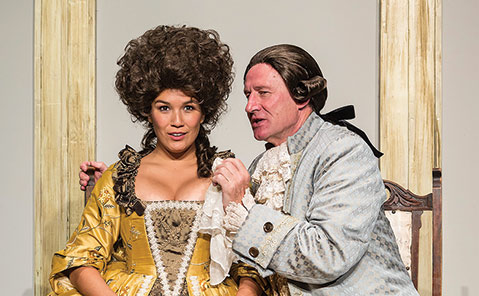Ensemble’s Mozart Effect
Peter Shaffer’s Amadeus Gets Revived

Plays about historical figures tend to focus on turning points for their protagonists. It’s natural to see the story of a great man from the perspective of some equally great decision. But when playwright Peter Shaffer took on the subject of Wolfgang Amadeus Mozart, he chose a very different approach. Recognizing that the composer’s departure from Salzburg and entry into the musical world of Vienna represented just such a crucial turning point, Shaffer instead discovered his plotline not in Mozart’s decision to reach for the top, musically speaking, but rather on the impact of his arrival there. Thus, Amadeus is centered on the repercussions of genius rather than its mysterious origins. Although the show (and its successful film version) is often remembered for its unvarnished portrayal of Mozart as a man who was as frivolous and irreverent as he was brilliant, it was Shaffer’s signal insight to reveal the implications of the Mozart revolution through the less than generous reaction of his contemporary and compositional rival, Antonio Salieri.
When Ensemble Theatre Company (ETC) opens its second season in the beautifully remodeled New Vic this weekend, it will be to the strains of some of the world’s best-known and beloved music, and with two world-class actors at the core of an all-star cast. ETC artistic director Jonathan Fox will direct Amadeus, and he says that he chose it because he “wanted to start the season with something majestic, and [because he also wanted] to bring together the city’s vibrant classical music community with its theater fans.” As a part of the latter effort, Ensemble will collaborate with the Santa Barbara Symphony on a one-night-only special performance in honor of Léni Fé Bland that will take place on October 21. Excerpts from the play will be performed interspersed with live music by Mozart, which will be played by members of the Symphony and conducted by maestro Nir Kabaretti.
As a conservatory graduate with an acting degree, Randy Harrison brings an intimate acquaintance with the rarefied world of classical music to his portrayal of Mozart. Harrison cites the ability of both theater and film to revitalize our perception of great music as one of the key factors that make Amadeus exciting. “Pieces that have maybe been overexposed as pure music come to life again when they interact with powerful dramatic images,” said Harrison. Part of the reason to see this play is to experience that kind of reawakening. The audience comes to Amadeus “wanting to be taken by surprise” by Mozart’s music, and Shaffer’s fanciful and melodramatic plot helps them to do so.
For Daniel Gerroll, the distinguished theater and film (Chariots of Fire) actor who plays the envious Salieri, the play “explodes the notion that artists must live up to the work.” Echoing his character’s motivating observation that Mozart did not always appear to deserve the extraordinary facility with which he was blessed, Gerroll taps into what is perhaps the play’s most profound source of intellectual stimulation — the relationship between the composer and society.
Thrust into a world dominated by a handful of aristocratic patrons when he was still a child, Mozart learned to please his masters and to resent their presumption. By portraying middle-class characters like The Marriage of Figaro’s Susanna and Figaro as self-confident and independent individuals, Mozart signaled his allegiance to an emerging social order, even as he elaborated dazzling examples of traditional musical forms. For a court composer such as Salieri, the volatile combination of Mozart’s musical genius, his sympathy with the bourgeoisie, and his extraordinary sense of his own worth must have been truly threatening. The intelligence of Shaffer’s decision to exaggerate Salieri’s resentment into homicidal malice thus has its basis in a real and complex social situation — the emergence of the composer as a symbol of the independent nature of the romantic artist.
“It’s a big vision,” says Fox of the play’s take on creativity and social control, “and God is the big offstage character. He is the invisible protagonist of what’s happening onstage.” Mozart’s absolute faith not only in his own talent but also in the ability of musical forms and of opera in particular, to deliver fundamental truths about humanity without recourse to dogma made him a paradox. On one side, he was an immature clown, constantly parading his vulgarity and prurience. On the other, he was the conduit for music that many consider to be the purest, most exalted sounds ever composed — a kind of direct line to some Platonic ideal. With Amadeus, Ensemble Theatre Company puts Mozart back in the middle of our ongoing conversations about art, love, and life.
4·1·1: Ensemble Theatre Company presents Amadeus at the New Vic (33 E. Victoria St.) from October 9-26. For tickets and information, call (805) 965-5400 or visit etcsb.org.



